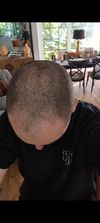community (M23)Been on DUT for a year and 1 month- so is a transplant not a good option if DUT doesn’t work🤷♂️
The user has been using Dutasteride for over a year for hair loss and is considering a hair transplant if it doesn't work. Suggestions include adding Minoxidil and microneedling, but some advise against a transplant as the current treatment seems effective.
